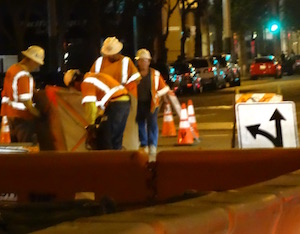
The streets of San Francisco already take a beating.
AT&T wants to decide where and how competitors install fiber in conduit, manholes and handholes that it owns. That’s the gist of its response to a complaint filed by Webpass with the California Public Utilities Commission.
California law requires any utility – telecoms or electric – that installs poles and conduit in the public right of way to share those facilities with any qualified competitor. Utilities can use this public property for free, but that gift comes with strings attached.
The rules laid down by the CPUC include standard methods for sharing costs and managing access, but many of the details are left to the companies involved to work out. Webpass – which is in the process of being acquired by Google – asked AT&T for permission to use its conduit in San Francisco. AT&T said yes, but. The but blew a hole in Webpass’ business plan.
At issue is whether Webpass can splice fiber inside AT&T manholes and install fiber in either empty inner ducts – physical subdivisions inside bigger conduit made via several smaller conduits or using other material – or in conduit or inner duct with an existing cable that doesn’t take up all the available space.
In effect, AT&T’s response admits that it routinely denies competitors access to its manholes and otherwise empty conduit space, but that it will magnanimously consider granting exceptions. At its discretion and according to undisclosed criteria.
Which is the problem. Conduit and pole access laws exist to minimise the damage and obstructions caused by digging in public streets and to try to create a more competitive market for services. AT&T response shows that it could care less about the former and doesn’t want the latter…
Webpass claims it has been unfairly discriminated against because it cannot place its splice cases inside AT&T’s manholes. Based on the license applications submitted by Webpass, Webpass intends to place a splice case in manholes owned by AT&T California that are located in the streets outside of each of Webpass’ customers’ locations. Webpass has informed AT&T California that this would include hundreds of manholes.
Just so. Webpass wants to compete against AT&T in San Francisco and it stands to reason that means hooking up a lot of customers that AT&T would prefer had no other choice.
Rather than allowing Webpass to put its splices inside AT&T manholes where there’s room, AT&T wants Webpass to dig its own holes in San Francisco streets where ever possible. That shifts the cost onto San Franciscans, who have to maintain the streets and who’ll pay a higher price for Internet access, either because Webpass’ costs go up or because it can’t do the project, leaving them in the grip of AT&T’s monopoly.
AT&T’s response offers the usual we only want to ensure reliability for everyone justification for its policies. That’s certainly a legitimate concern and it should be factored into public right of way access decisions, but those decisions should not be left solely in the hands of AT&T, which also has less altruistic motives at heart.
